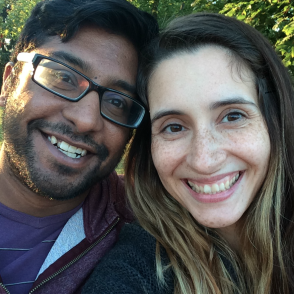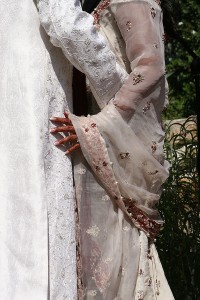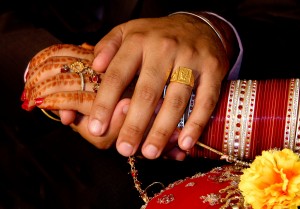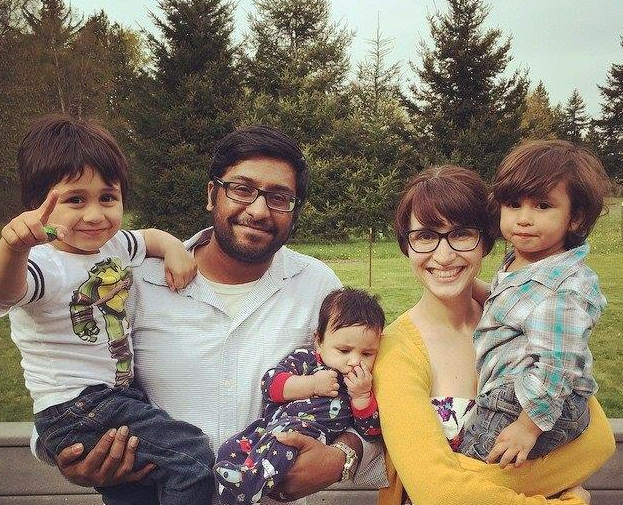By Brittany Muddamalle
Follow Brittany at @almstindianwife and at almostindianwife.com
My husband and I knew, early on what we were signing up for. While we both grew up in the US, we were raised in two very different cultures. If we were going to start a family together, we were going to have to blend two distinct cultures. We never hesitated. My husband was very comfortable with western culture and I was excited to learn more about Indian culture.
We both knew it would be a lot of work to make our intercultural relationship work, but we loved each other and knew we could to it. It would take patience, a lot of communication, and an open mind.

We were immediately faced with situations that required us to blend cultures after we got married. One of those was how involved our families would be in our life.
My family was always there for us, but understood we wanted some space and independence as we figured out what we wanted our life to look like. They would give us advice, but ultimately knew we would decide what we wanted on our own. My husband’s family took a more hands on approach in supporting us. They wanted the best for us and often times that meant telling us what to do.

Even after we started to have kids, I saw this wouldn’t change. I was very surprised to see how both of our families decided to help us. My family would wait for us to ask and then would jump on the chance. They understood that we wanted to figure out how to be parents on our own. My husband’s side of the family didn’t wait. They jumped in and told us what they thought was best. My father-in-law even moved in with us for the first few months after we had each of our babies.

It took me some time to adjust to how close my husband’s family was. They acted as a family unit. Even thought we were parents, we were expected to head all advice. I always thought my family was close, but they took it to a new level. Both of our families have always been there for us and they have done it in completely different ways.
I knew situations like this would come up as we raised our children. My husband and I grew up differently and our families functioned differently as well. What I didn’t realize was that our families would be faced with similar situations. We signed up to be in an intercultural relationship and that meant we signed up our families as well.

Along with the different names for family members, the hierarchy it stood for was different in my husband’s family.
In a typical American family, these terms all held significant importance. It meant you were something more than just a friend. It also showed where you stood in the family. Grandparents were extremely important and close to the top; whereas cousins were lower on the list. My husband’s side didn’t look at the hierarchy the same way. They looked at all elders as equal. You needed to respect anyone older than you. If an aunty told you to do something, you would listen just like you would if it was your own mother.
I don’t think any of us realized this would be an issue because none of us had ever faced this before. This was hard for my family because they were so excited to be called uncle, grandma, and grandpa. They wanted to hold that special place in their lives. That place that no one else would ever have.
It was hard for my family to hear so many people would share similar names to them. They felt like something was being taken away from them, much like I did. We also had to explain that we were teaching our children to treat everyone equally. This meant no one was more significant than the other.
It took them a little while to process this, just like it took me. It wasn’t that they were against what we were teaching; it was just a foreign concept to them. They were raised with the understanding that grandparents and parents were the ones with the utmost authority and needed to be respected the most, not everyone older than you. After they started to see us walk this out, they were very supportive and agreed. They saw the benefit in it and saw how respectful our kids were being towards all of their loved ones.
It also helped that they saw this by no means meant our kids wouldn’t be obsessed with their grandparents. They could still spoil them and treat their grandkids like royalty. In return our kids would have a very special relationship with them.

family;culture
My husband’s family has struggled with us blending cultures as well. They want our children to be exposed to Indian culture, not just know a few details. They want to share everything they learned by growing up in India with them. It has been difficult for them because they fear our children won’t know the culture. We’re raising them in the US, which means their Indian culture will always be secondary.
It’s been tossed around in jest to send our kids to India to live with my husband’s grandparents. While it’s mostly a joke, I think there is a level of truth to it. They wish we could live for an extended time in India with our children. In their minds, it’s the only way for our children to fully understand that part of their culture.
We definitely want to take our children to India, but don’t have any plans to live there right now. Growing up, his parents assumed they would have grandkids fully immersed in their culture. It has taken time for them to understand why we’re choosing to raise our children in the US. Especially when that means we don’t partake in all of the Indian customs, traditions, and holidays.
Having an intercultural family means our kids will be raised in two distinct cultures. Our families will have moments of conflict with the way we raise our kids because it’s going to be different. There is no way to blend cultures without creating a new path for our children.
It would be easier if we did things the same way our families did because they would expect that and understand, but it’s not possible for us. Our families didn’t sign up for an intercultural family like my husband and I did, but it does affect them. They have two options in how they can respond. They can get upset and refuse to understand a new way of doing things or they can be open.
We are doing our best to teach our families about both cultures as things come up. Usually they’re open and understand and other times it takes longer. We’re all trying to figure out what it looks like to have an intercultural family. If it’s worth it, you will all love each other through the conflicts and figure it out.



There are no comments
Add yours